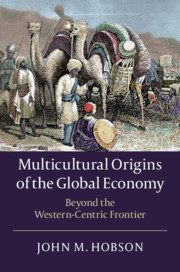Book contents
- Multicultural Origins of the Global Economy
- Multicultural Origins of the Global Economy
- Copyright page
- Dedication
- Contents
- Figures
- Tables
- Acknowledgements
- 1 Mapping a New Global Political Economy
- Part I Multicultural Origins of the First (Historical Capitalist) Global Economy, 1500–1850
- Part II What Was Global about the First Global Economy, 1500–c. 1850?
- Part III Empire and the First Global Economy in the Making of Modern Industrial Capitalism, 1500–1800
- Part IV The Second Great Divergence, 1600–1800: Differing ‘Developmental Architectures’ in Global Contexts
- Part V Rehabilitating and Provincialising Western Imperialism: Afro-Asians inside and outside the Shadow of Empire
- 13 Multicultural Origins of the Second (Modern Capitalist) Global Economy
- 14 Varieties of Global Economy
- Book part
- Bibliography
- Index
14 - Varieties of Global Economy
From Historical to Modern Capitalism, c. 1500–2020
from Part V - Rehabilitating and Provincialising Western Imperialism: Afro-Asians inside and outside the Shadow of Empire
Published online by Cambridge University Press: 17 December 2020
- Multicultural Origins of the Global Economy
- Multicultural Origins of the Global Economy
- Copyright page
- Dedication
- Contents
- Figures
- Tables
- Acknowledgements
- 1 Mapping a New Global Political Economy
- Part I Multicultural Origins of the First (Historical Capitalist) Global Economy, 1500–1850
- Part II What Was Global about the First Global Economy, 1500–c. 1850?
- Part III Empire and the First Global Economy in the Making of Modern Industrial Capitalism, 1500–1800
- Part IV The Second Great Divergence, 1600–1800: Differing ‘Developmental Architectures’ in Global Contexts
- Part V Rehabilitating and Provincialising Western Imperialism: Afro-Asians inside and outside the Shadow of Empire
- 13 Multicultural Origins of the Second (Modern Capitalist) Global Economy
- 14 Varieties of Global Economy
- Book part
- Bibliography
- Index
Summary
Chapter 14 closes the book by extending the analysis of chapter 8 and focuses on the two global economies. To counter the final Marxist rebuttal of the existence of a global economy before the nineteenth century, the first section brings into focus a key property of the first global economy (FGE): specifically the global Afro-Indian cotton whip of necessity. It also differentiates this from its modern capitalist successor that is given much emphasis by Marxists. The second section challenges the prevailing assumption in IPE and IR, not to mention many other disciplines, that transnationalism within a properly global economy emerged only after 1945/1979, given the (highly problematic) belief that mercantilist internationalisation prevailed before then. I challenge this temporal binary conception by revealing a significant number of important continuities between the two global economies. I focus on eleven ‘temporal capillaries’ that weave together the two global economies. For in highlighting critical continuities so I argue that the modern global economy is less unique than globalization scholars presume and that many of its features originated within the FGE.
Keywords
- Type
- Chapter
- Information
- Multicultural Origins of the Global EconomyBeyond the Western-Centric Frontier, pp. 433 - 455Publisher: Cambridge University PressPrint publication year: 2020

